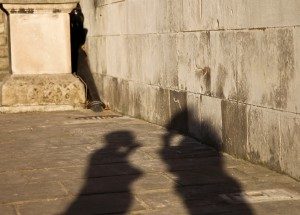 Sometimes there are sessions when nothing seems to be working right. Kicks feel heavy. Throws don’t work. Patterns are corrected, and then corrected again. The novice expects to feel a certain amount of incompetence, but for the senior belt this can feel like you’re regressing while everyone around you keeps climbing higher and higher, leaving you behind. This can wear on emotions and in some instances people decide to quit.
Sometimes there are sessions when nothing seems to be working right. Kicks feel heavy. Throws don’t work. Patterns are corrected, and then corrected again. The novice expects to feel a certain amount of incompetence, but for the senior belt this can feel like you’re regressing while everyone around you keeps climbing higher and higher, leaving you behind. This can wear on emotions and in some instances people decide to quit.
At those times it’s important to remember that our feelings can give an inaccurate sense of our real ability and how we’re progressing. If we can embrace the discomfort of a bad session, it can become the very thing that will move us forward.
Figuring out what works is often a process of elimination. Every time we discover what doesn’t work, we move closer to solving a problem, overcoming an obstacle, or making a personal breakthrough.
But that can be an incredibly hard process if we don’t also foster the quality of non-judgement. Non-judgement means that we don’t feel ‘less-than’ because of a bad session, or compare our own ability or progress to anyone else. It means that we are simply aware of what is happening and don’t limit ourselves and our abilities.
Those days when nothing goes right, or the times when we feel like we’re not making any progress, have a real value. They help us to realise that success is a process. For me, mastery isn’t a destination; it’s a habit – a habit of learning.
One of my favourite quotes is from the legendary cellist Pablo Casals. He was asked why he continued to practice at age 90. “Because I think I’m making progress,” he replied.
